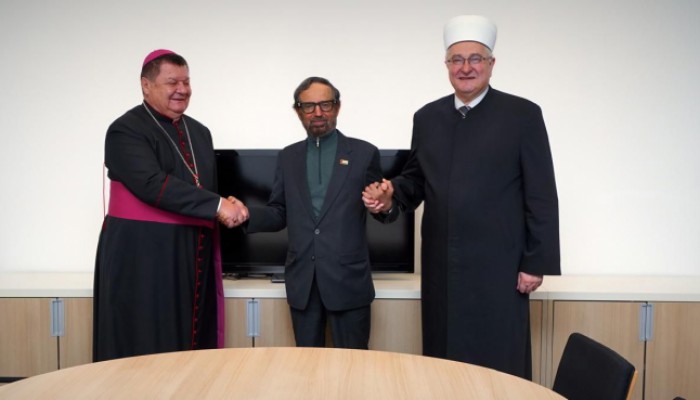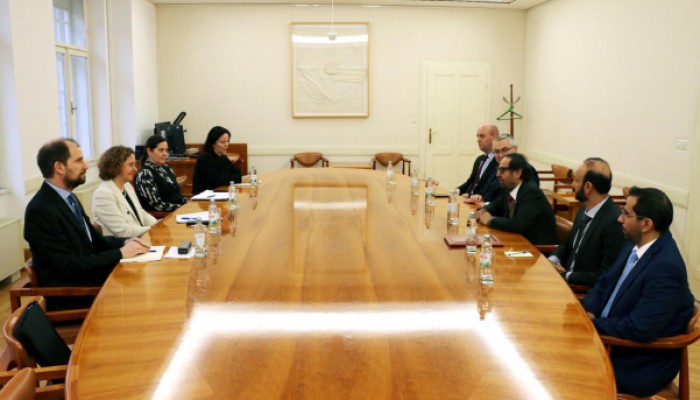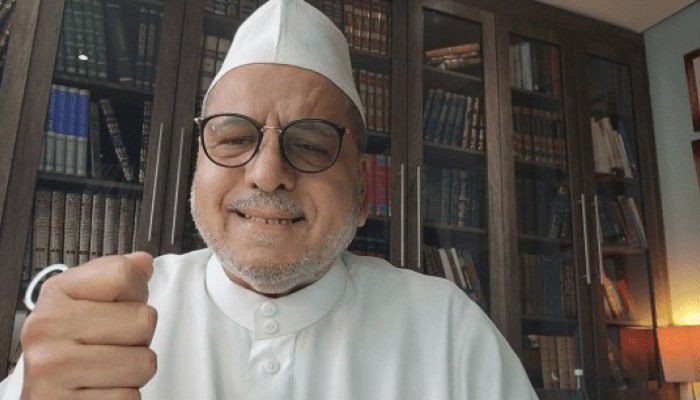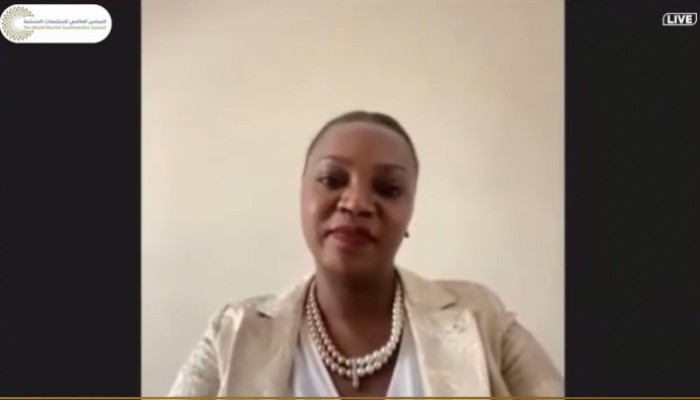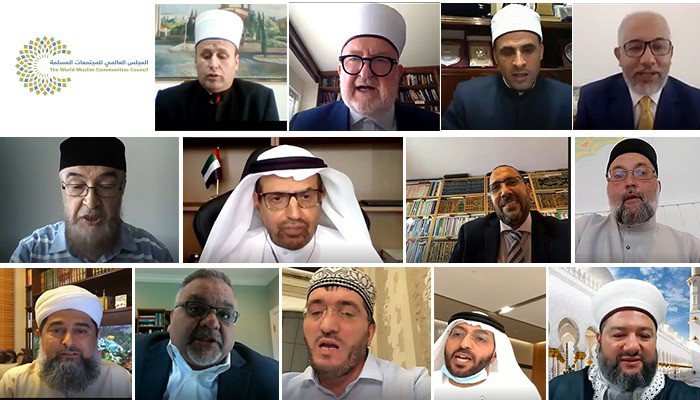
The virtual seminar 'The Higher Objectives Of The Peace in Islam’ calls for upholding tolerance and peaceful coexistence between nations and peoples
- 2020-Sep-03
Participants in the virtual seminar 'The Higher Objectives Of The Peace in Islam’, organised by the World Muslim Communities Council, Saturday August 29, 2020, with the participation of a number of honorable scholars, affirmed that the decisions for war and peace are prerogative to the ruler only. And in no way it is permissible to anyone other than him, inside or outside his country to interfere in determining nor implementing them. And that this is what is known in the contemporary world as the concept of national sovereignty, calling on scholars, thinkers and researchers to uphold the principle of tolerance and peaceful coexistence between nations and peoples and the preservation of human dignity without discrimination on the basis of religion or gender or race.
It was held in the presence of a number of religious leaders and muftis from the Arab Republic of Egypt, South Africa, Australia, Russia, Sweden, Britain, Greece, Sri Lanka, Canada, Pakistan, Bosnia and Herzegovina, India, the United States, Estonia and other countries of the world. The conferees called for stressing that the rules of legal policy for Muslims throughout history bore the ruler responsibility for whom he manages their affairs, and he must assess their immediate interests, and take decisions and actions that preserve their interests, and preserve their security, stability, and well-being.
In his opening speech in the virtual seminar 'The Higher Objectives Of The Peace in Islam’, which was attended by more than 100 participants, HE Dr. Ali Rashid Al Nuaimi, The head of the World Muslim Communities Council said that the issue of peace is of great importance. As well as raising awareness of the correct understanding of the concept of peace and confronting extremism discourse. He said :" We have to be proud of the religion and its constants and be aware of the changes in establishing the humanity of the religion'. He explained that changes have occurred in the nature of all societies, and that when we talk about Islam; there are more than 600 million Muslims living in non-Muslim countries and their interests must be taken into consideration.
His Excellency called for the establishment of a culture that leads to an authentic, Islamic reference to the concept of peace. And to avoid the lack of a correct understanding of the concept of peace or the discourse of extremism that has gripped many in the name of Islam. He said: 'Our Islam is a religion of mercy and peace, and the need to repeat the conversation about the constants of religion so that the abnormal voices do not prevailed and become the reference for Muslim youth'.
His Excellency Prof. Dr. Muhammad Mukhtar Jumaa, Minister of Awqaf of the Arab Republic of Egypt, explained the words of peace and Islam, stressing that they belong to one linguistic root, which is the article 'Peace'. The most important characteristic of this linguistic root is the meanings of peace, because Islam is the religion of peace and our Prophet is the Messenger of peace, the greetings of Islam and Muslims is peace and paradise is the abode of peace.
The Egyptian Minister added: 'Allah (Glorified and Exalted be He), has forbidden us to mistrust those who give us peace, and the philosophy of peace is an issue entrenched in Islamic thought 'O You who have believed, enter into Islam'. For peace in Islam is a comprehensive peace with the soul, the other, the society and the animal, inanimate objects and with the whole universe. He also said:' We affirm with reassurance that our religion is the religion of peace and the philosophy of peace is the authentic philosophy firmly rooted in Islam'.
Dr. Mohammed Mattar Al Kaabi, Chairman of the General Authority of Islamic Affairs and Endowments, Awqaf, said that safety and peace are two great blessings and they are the basis of life, progress and urbanization, and a necessary requirement for all human beings. He said:' Our true religion came to establish relations between humanity on solid foundations of justice, peace and advancement to the level of acquaintance and cooperation. Peace is the basis of life, progress, reconstruction and war is the exception, and our religion commanded us to spread peace amongst people'.
He explained that the UAE made of the peace accord will reflect great achievements and gains for the Palestinian people and for Jerusalemites in particular. He also referred to the decision of the International Islamic Fiqh Academy of the Organization of Islamic Cooperation in its 22nd session in Kuwait (March 22-25, 2015), regarding the visit to Jerusalem: the objectives and legal rulings where the Synod believes that the appreciation of these interests is up to the specialists from the leaders and politicians in the countries of the Muslims, and confirms that Al-Quds Al-Sharif is for all Muslims and Jerusalem is the cause of the entire Ummah, and it is necessary to support its people and the people of Palestine, and that preserving Al-Aqsa Mosque is part of the faith and responsibilities of Muslims.
As for Dr. Mohamed Bechari, Secretary General of the World Muslim Communities Council, he said that peace is a pillar of religions and a long tradition at the heart of history, and that entering peace from the faculties of Sharia and peace is the basis of Islam. And Islam established peace as a base for treatments, starting with greeting. Dr. Bechari affirmed that self-preservation is a supreme necessity that cannot be achieved without preserving homelands and respecting their sovereignty, as peace is considered a fundamental point in achieving the goal of human existence from the succession and reconstruction of the earth.
Sheikh Bujar Spahiu chairman of the Islamic Sheikhdom in the Republic of Albania said:' Our Islamic religion, is the religion of love and peace. Moreover, Islam and peace meet in providing tranquility. It is not strange that the word Islam combines the same letters of Salam (peace), and Islam rejects violence and extremism. He added:' If we take a brief look at the prophets in general, may peace and blessings be upon them, we would find that they all took peace as a method and a goal on which all their actions are based. Sheikh Spahiu affirmed that among the peace outcomes for society is to make human life more stable, enjoyable, and prosperous, and to achieve human security and emphasize that the human being is more important than Land, and reduce the massive population migrations.
Sheikh Abubakr Ahmad the Grand Mufti of India said:' God Almighty created us different and varied, so that we could coexist together and cooperate in order to bring peace to everyone. And therefore maintaining security and stability is one of the most important pillars of the existence of the human kind. For Islam did not order us to fight other religions, but God cherished Islam with good morals. He affirmed that terrorism and extremism are not in Islam. And added:' But our religion is a religion of love, mercy, peace and morals'. He also noted the experience of the United Arab Emirates in promoting peace in the world, and that it is at the forefront of countries that seek union and cooperation between peoples and religions.
His Eminence Sheikh Nafiullah Ashyrov, grand mufti and head of the Central Religious Department of the Muslims of the Asian Section in the Russian Federation, highlighted the importance of peace in the life of the individual and society, through it there is no violence, enmity, fear and wars. As peace is an innate nature in the human being against war, enmity and discrimination. He affirmed the existence of inner peace within the state, as well as the external political peace that the world needs to eliminate conflicts and violence between countries, and the extent of our need as well to implement and promote peace within the family and in all aspects of our lives. He said:' The Islamic religion came to establish security and peace among members of the human community, as it is the basis for establishing human values, as peace is the greeting of Islam'.
His Eminence Shiekh Eldar Yassin Mufti of the Estonian Islamic Society referred to the experience of Muslims in Eastern Europe who are well aware of the importance of peace due to World War II. He stressed that the European continent has been living in peace for half a century enjoying the blessing of safety, he pointed out also to the need to teach our children peace and pass it on to future generations.
His Eminence Alaa Al Sayed member of the Canadians Council of Scholars, said that the Islamic lifestyle preceded all laws, this particular style that preserved everything in a person’s life. He added:' Islam laid the foundations of peace in our lives so that we could practice them properly in a way that preserves our lives and the lives of everyone'. He called for the need to strengthen human fraternity, for everyone has rights on us Muslims, and it is not possible to harm others, but rather to consolidate affection, compassion and morals, which are among the foundations of peace in Islam. He also said:' As Well as rebuilding peace within us and living by consolidating the values of Islam so that we can be good and belonging to our societies'.
His eminence Ibrahim Mogra former Assistant Secretary General of the Muslim Council of Britain, affirmed that every religious community has a choice in terms of freedom of religion in light of the difference that we live in. He said:' Our religion teaches us how to respect difference and establish peaceful coexistence between religions by spreading peace, as human rights can be achieved through their safety'. He also said:' We have no choice but to be Muslim and peaceful, and as Muslims we have to be beacons for peace in order to win friendships and brotherhood and give a good picture of our religion'.
The sessions of the symposium answered several questions raised by the conference, such as what are the supreme objectives of establishing international relations based on peace among Muslims, as a theoretical problem with complex realistic dimensions. As well as the possibility of achieving succession and reconstructing the land without peace, with the assertion that succession and the reconstruction of the land are the supreme goal of human creation in this universe, and how to achieve acquaintance between peoples and tribes, which represents a goal of human diversity without the existence of peace, security and stability.
The sessions also discussed the reasons for which God Almighty forbidding the support of the oppressed Muslims if they are persecuted by a people between them and the Muslims in a covenant and a covenant "as mentioned in verse 72 of Surat Al-Anfal. And whether this is conclusive evidence of the primacy of peace and respect for contracts and treaties on the bond of Islamic brotherhood. As well as knowledge of the wisdom of the divine call that orders Muslims to enter all peace as mentioned in verse 208 of Surat Al-Baqarah, and to consider everything that contravenes peace following the steps of Satan.
After the extensive discussions and research presented, the conferees concluded the following recommendations:
First: Peace is the root and foundation of the relationship between Muslims and others, and it is the base for international relations in Islam. And concerning war, it is an emergency event that should not be sustained or prolonged, and there must be a return to peace, because with it the interests of the people and the country are fulfilled.
Second: The basic principle with regard to Muslims dealing with others is that they are advocates of peace and greet them with peace, and prepare them for force and prepare them with it to deter aggressors and not eliminate them. The Qur’an’s call to prepare force with it 'By which you may terrifying the enemy of Allah and your enemy' is a call to prevent wars.
Third: The scholars must work to establish discourse between religions, civilizations, cultures and peoples, in replacement of strife, fighting and disagreement. It is crucial that the purpose of their religious calling and discourse to be bloodshed and preserving people's interests, protecting homelands, and achieving world peace.
Fourth: Calling scholars, thinkers, and researchers to uphold the principle of tolerance, peaceful coexistence between nations and peoples, and the preservation of human dignity without discrimination on the basis of religion, gender or race.
Fifth: Emphasizing what was stated in the Makkah al-Mukarramah Document, which was approved by 1200 scholars and jurists representing all the peoples of the Islamic world and its countries on the twenty-fifth of the blessed month of Ramadan 1440 AH, corresponding to May 30, 2019 AD. And the document represents an extension and foundation to the Medina document on which the Prophet (PBUH) founded The first multi-religious and multi-ethnic Muslim society. And we stress here the fourth item in the Mecca Document which states: 'Religious and cultural diversity in human societies does not justify conflict and clash, but rather calls for establishing a (positive)civilized partnership and effective communication that makes diversity a bridge for dialogue and understanding, cooperation for the benefit of all. Which stimulates competition in the service and happiness of mankind, and the search for common participants, and their investment in building a state of comprehensive citizenship, based on values, justice and legitimate freedoms, mutual respect and love of good for all.
Sixth: Emphasizing the decision of the International Islamic Fiqh Academy on visiting Al-Aqsa, in the period from: 2-5 Jumada al-Akhira 1436 AH, corresponding to: 22-25 March 2015 CE. Regarding the legality of visiting the Al-Aqsa Mosque as it is a legitimate policy prerogative to the ruler, and it is stated as follows: 'The Synod believes that the evaluation of these interests is up to the specialists who are the rulers and politicians in Muslim countries. It is necessary to remind all Muslims that: The issue of Holy Jerusalem is the cause of the entire Ummah, and that it is imperative to support it, and to support its people and the people of Palestine'.
Seventh: Emphasizing that the rules of Sharia policy among Muslims throughout history have held the ruler is responsible for those who he manages their affairs. And he must assess their interests and conditions, and take decisions and actions that preserve their interests, and preserve their security, stability and well-being.
Eighth: Emphasizing the stability of political practices throughout Islamic history. And what the rules and methods of legal policy are based on, and what contemporary international law follows in that the decision of war and peace is the exclusive authority of the ruler. And under no circumstances may anyone interfere in such determination or action other than him, whether it is from inside or outside his country. This is known in the contemporary world as the concept of national sovereignty.
At the end of the seminar, the participants sent a telegram of thanks and gratitude to the United Arab Emirates, its wise leadership, and its continuous efforts in serving humanity. And calling for the UAE and its people perpetual peace, asking God to relieve the UAE and the rest of the countries from the Corona epidemic. They also thanked the World Muslim Communities Council for its constant endeavor to serve the issues of Muslim societies and maintain continuous communication with its representatives.




